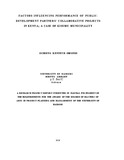| dc.description.abstract | Since 1980s there has been a paradigm shift on the role of the state in delivery of services from
being the sole doer to actually being a facilitator in expansive public service delivery agents
which include the private sector and the NGOs. However, like many other endeavors, it has not
been without some pitfalls. This study sought to explore factors that influence the performance
of public - development partners' collaborative projects in Kenya, by taking the case of the
Municipal Council of Kisumu. The objectives for this study revolved around factors like
planning for projects, management of projects, implementation of projects, redress mechanisms
and ways of strengthening the collaborative projects. The study sought to answer the questions
of how planning, management of projects, implementation, redress mechanisms and factors
strengthening collaborative projects influenced the performance of such projects.. The influence
of planning for projects, management of projects, implementation of projects and redress
mechanisms exemplified the factors under consideration, while timeliness, cost effectiveness,
quality, completion rate, relevance, sustainability and efficiency will exemplified performance.
The study population comprised the mayor, six committee chairmen, the town clerk and other
14 chiefofficers and the District Development Officer (DDO). The target population was a total
of 23 people. This was found to be ideal because the nature of information being investigated
was focused. Thus purposive sampling technique was employed for the study. The study was
conducted using descriptive survey; data was collected using questionnaire, interview, and
document analysis techniques. For purposes of validity and reliability of data, pilot testing of
the instruments was carried out and contcnt validity was done using the results of the pilot study.
The data collected was analysed using descriptive statistics. The result was presented using
frequency tables. It was established that management of financial resources through proper
control mechanisms, compliance with budgetary provisions, cash flow management enhanced
performance of the collaborative projects. This was among other findings. Majority of
respondents 10(66.7%) for example, acknowledged that the level of participation of stake
holders in all aspects of the collaborative projects enhanced their performances. In conclusion
the study established that proper management of project resources, participatory planning
processes, proper supervision and adherence to quality and legal parameters during
implementation as well as M& E among others enhanced performance. As a way forward the
study highlighted stakeholder involvement, proper supervision and stringent measures of
ensuring value for money as some of the major factors that could enhance the performance of
public - development partners's collaborative projects. | en_US |



